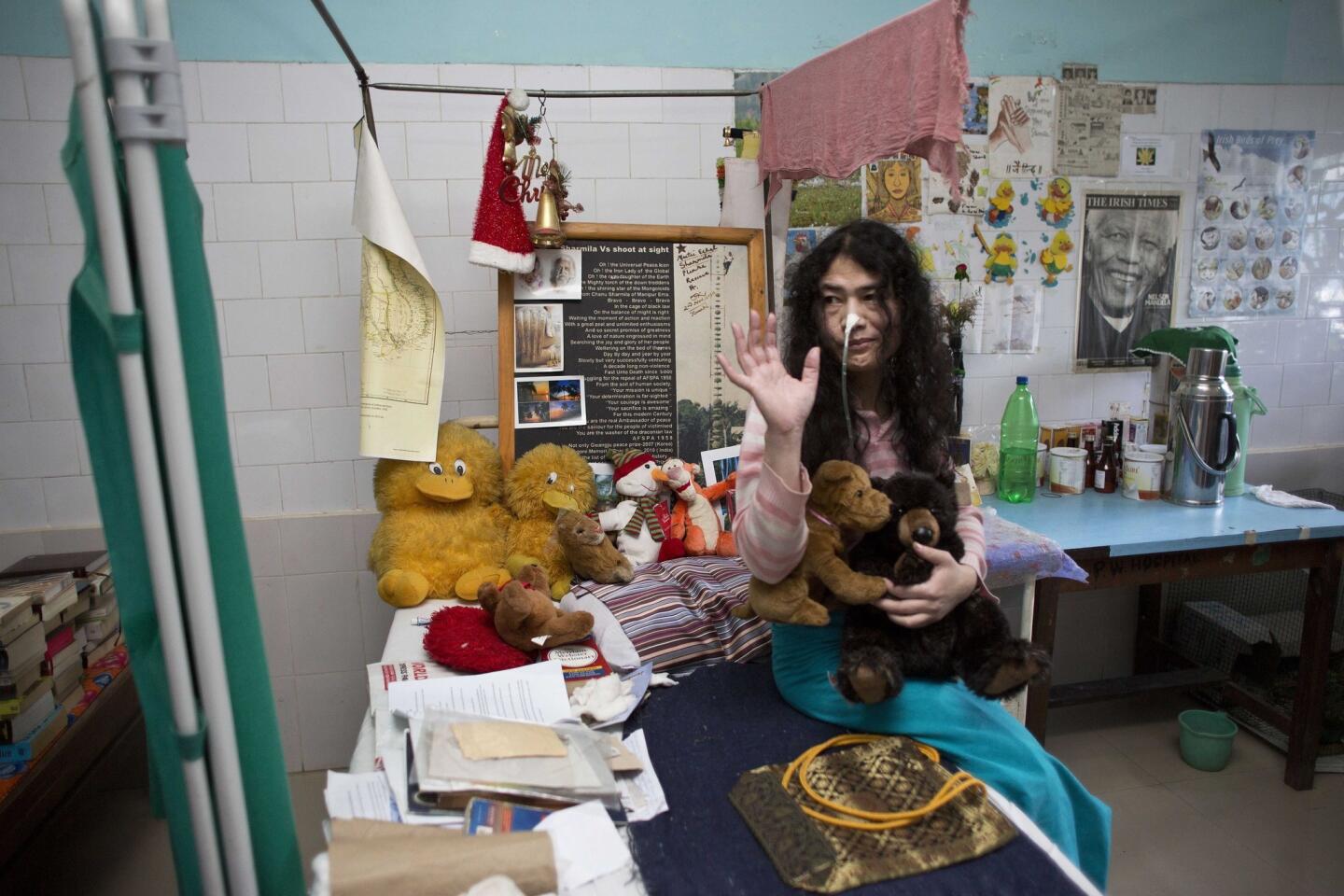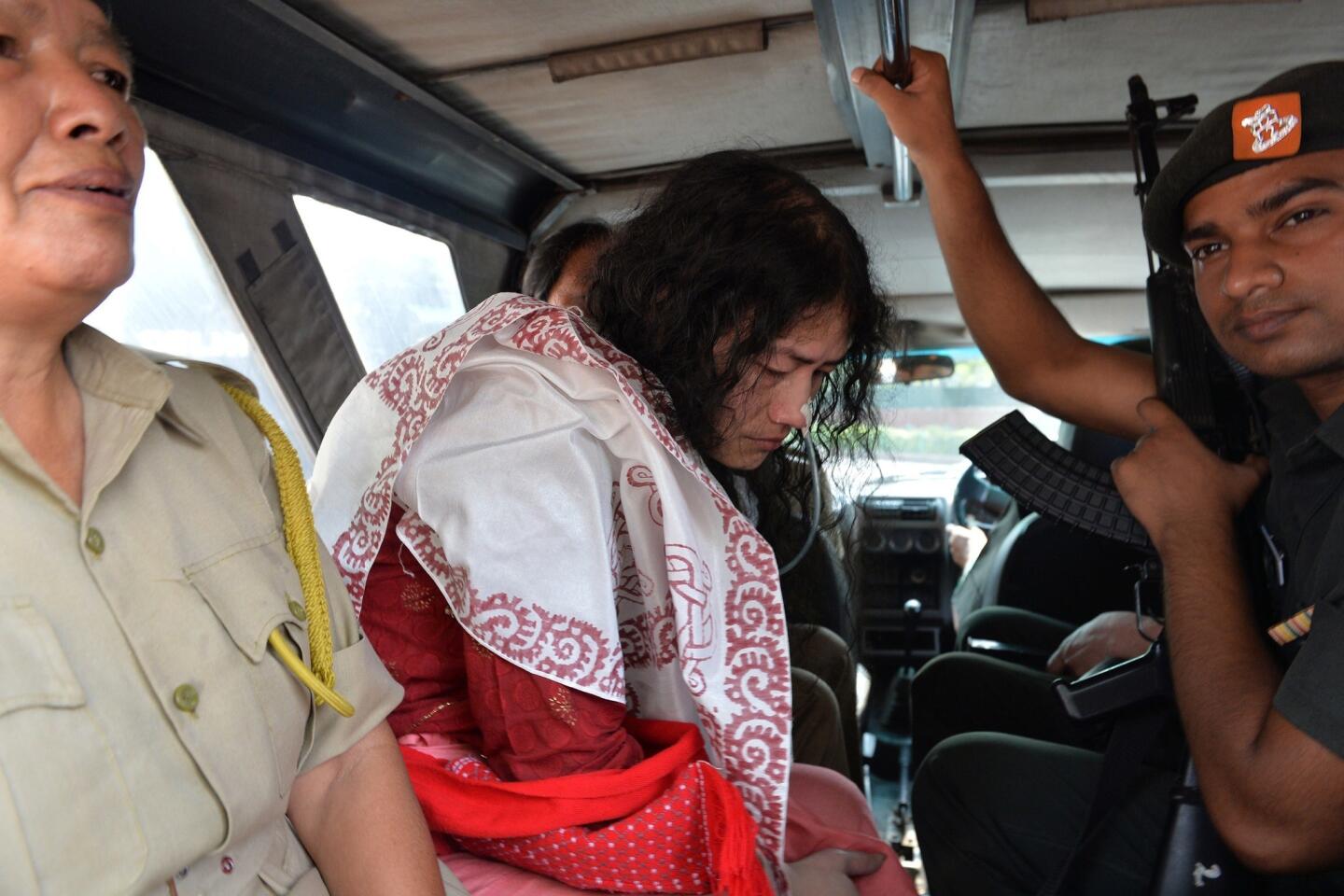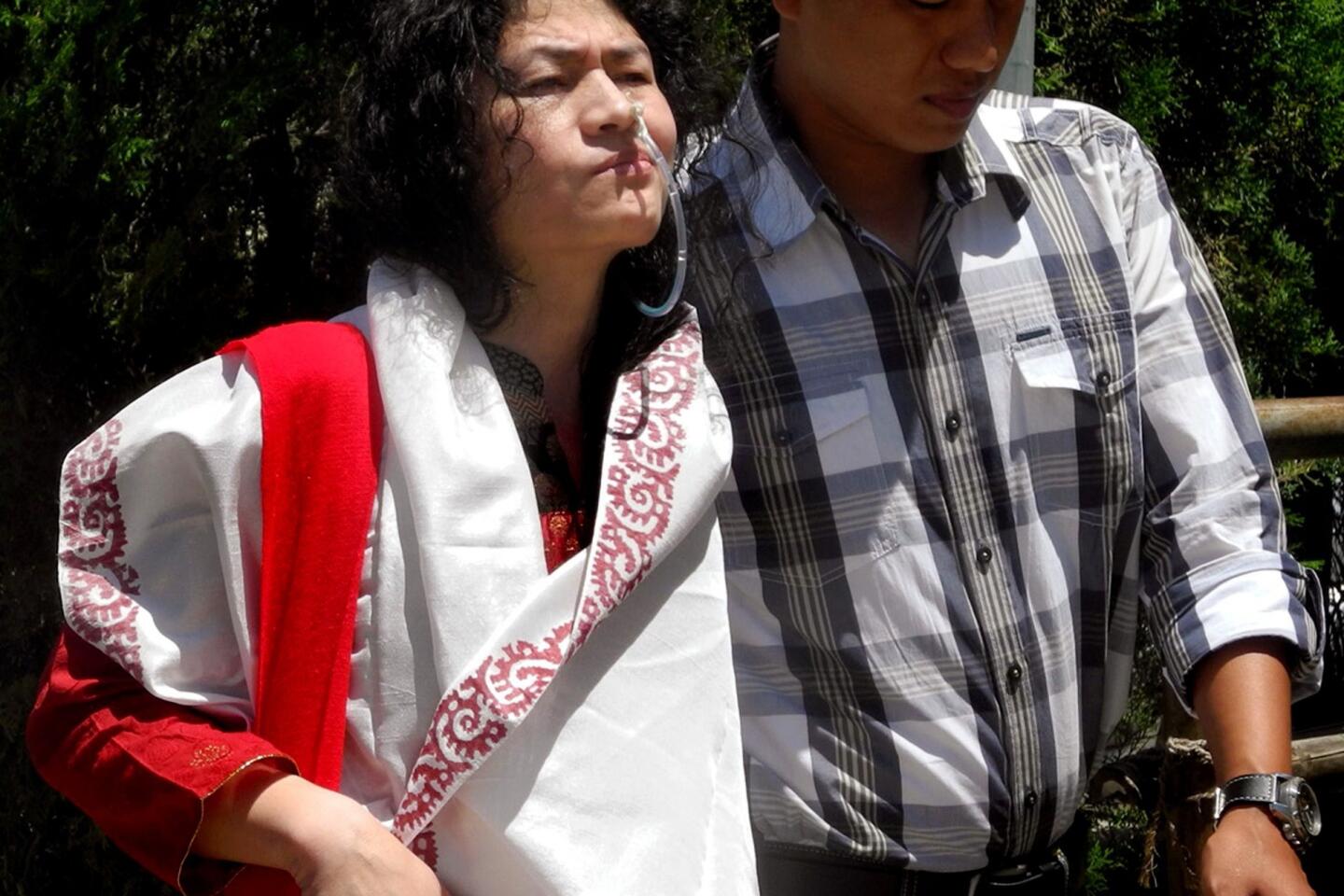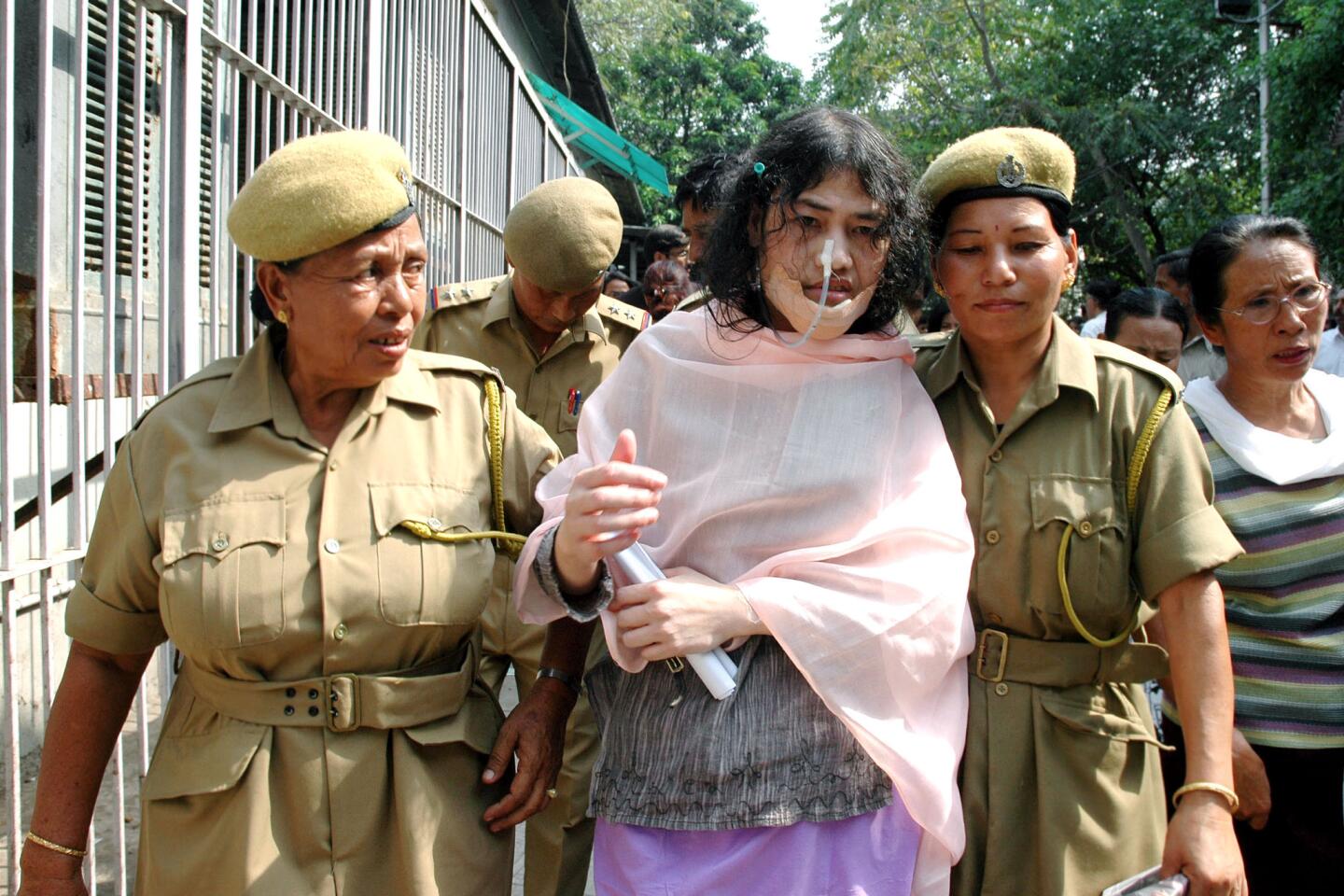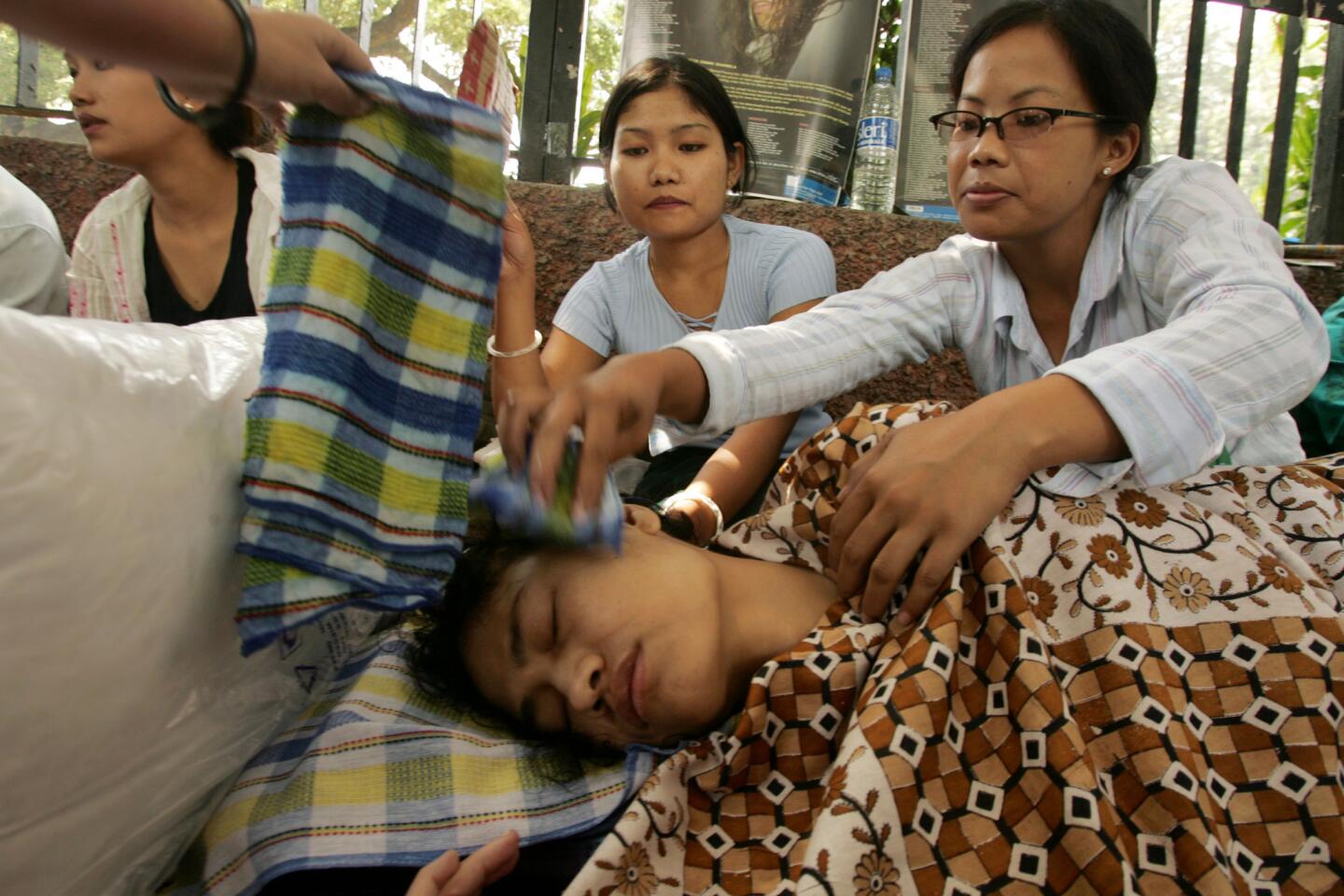Why an Indian activist plans to give up her 16-year hunger strike
- Share via
Reporting from Mumbai, India — On the first Thursday in November 2000, Irom Sharmila was observing a weekly religious fast. She did not know it would be 16 years before her next regular meal.
That day, Indian security forces killed 10 civilians at a bus stop in Sharmila’s restive northeastern state of Manipur, prompting her to begin what has become the world’s longest hunger strike, opposing a controversial law that grants impunity to the Indian armed forces in troubled regions.
Since then she has been confined to a hospital ward and force-fed through tubes in her nose, emerging as a symbol of pacifist resistance to military atrocities in her isolated state. But last week she surprised even her closest associates by declaring that she would end her strike on Aug. 9.
“This has been my life for the past 16 years,” the thin, frizzy-haired Sharmila, 44, told a small group of associates who met her the next morning outside the hospital in Imphal, the capital of Manipur. “I want my life back.”
In 2011, Sharmila’s mother spoke of the heartbreak of her daughter’s path »
Sharmila said she plans to run for office in state elections next year, and that she would marry her fiancé, an Indian-born Briton who began writing her letters after reading about her in 2009.
Her announcement has sparked a debate in insular Manipur, a remote state of forests and rolling hills along the border with Myanmar. Many supporters worry that Sharmila’s cause will be sullied by electoral politics, and they question the influence of her fiancé, Desmond Coutinho, described by her fellow activists as a bit of an eccentric.
But others believe the woman who has become known as the “Iron Lady of Manipur” simply calculated that her long, solitary struggle needed a new strategy.
This has been my life for the past 16 years. I want my life back.
— Irom Sharmila
“The idea and the issue she is fighting for is bigger than the person,” said Sanjoy Hazarika, director of the Center for North East Studies and Policy Research in New Delhi.
“I don’t think she’s withdrawing from the battlefield. Those who have supported her in the need to repeal this law need to give her the same dignity and respect she was given when she was on the hunger strike.”
The Armed Forces (Special Powers) Act was established in Manipur in 1958, granting the Indian security forces widespread authority over a state where several local insurgent groups were agitating for independence. Sharmila, the youngest of nine siblings in a lower middle-class family, grew up amid curfews and a heavy presence of army soldiers and police commandos.
After failing out of the 12th grade, she wrote a newspaper column and traveled through the state on her bicycle, documenting reports of abuses by security forces for a local human rights organization.
On Nov. 2, 2000, a roadside bomb detonated near a paramilitary vehicle outside Imphal. Although there were no injuries, the commando unit retaliated by opening fire on residents, killing 10 people. The paramilitary force said its men had acted in self-defense, although a judicial inquiry found no evidence to support that claim.
The special powers act meant that no member of the security forces could be held accountable for that incident or any other atrocity. Activists say there have been more than 1,500 extrajudicial killings in Manipur over the last two decades. Indian forces deny allegations that their members have committed abuses.
Last month, the Indian Supreme Court ruled that the armed forces cannot use excessive powers under the law, a key victory for rights groups, who still want the law overturned altogether. Supporters credit Sharmila’s fast for bringing attention to the law, which is also in force in the volatile northern state of Kashmir, the subject of an intractable territorial dispute with Pakistan.
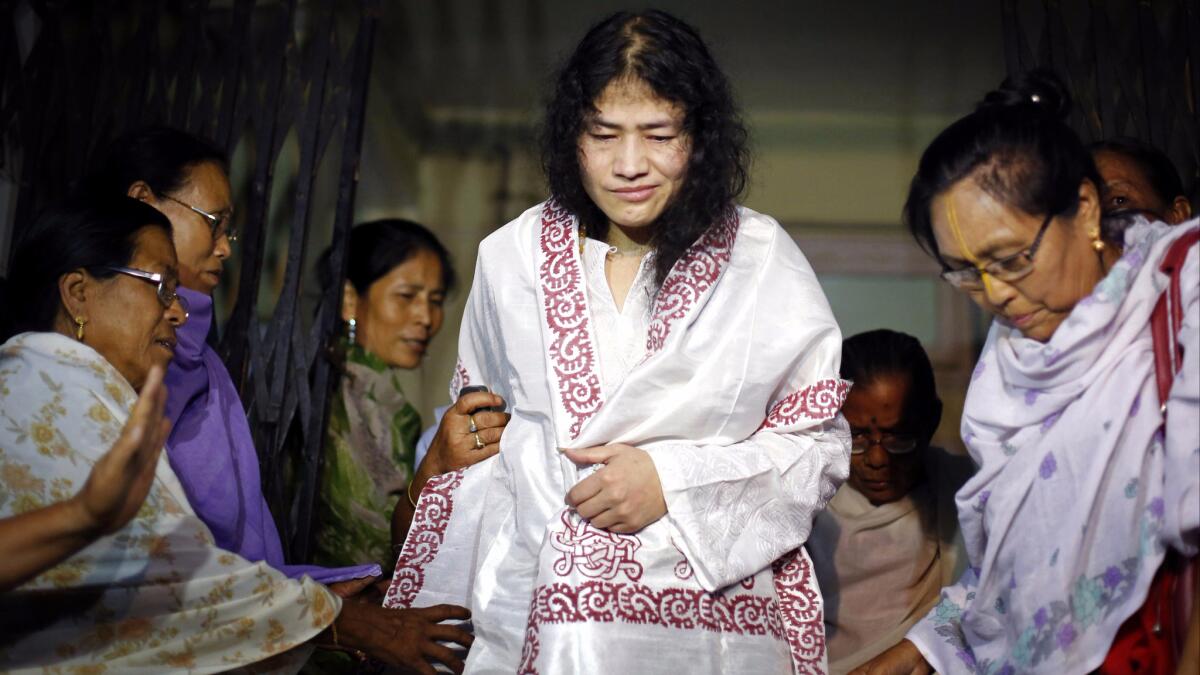
Babloo Loitongbam, a local human rights activist, said that when Sharmila began her fast it was seen as almost sacrilege to question the Indian security forces.
“Today, we see widespread debates” on the special powers act, Loitongbam said. “Sharmila’s contribution in this transition is immeasurable.”
Indian authorities have kept Sharmila under near constant arrest, periodically releasing her briefly, only to detain her again on charges of attempted suicide. Her struggle has unfolded far from the media glare of New Delhi or Mumbai, and the three-times-daily force-feeding has ensured Sharmila stays alive — “an easy status quo that allows the government to do nothing” about the controversial law, author Anubha Bhonsle wrote in a recent column.
“Maybe it was easier for the government to deal with a solitary hunger strike in a distant part of the country,” Hazarika said. “But that does not detract from her courage or the magnificence of the struggle.”
Sharmila, who passes her time writing poetry, reading literature and taking walks with visitors in the hospital compound, has said over the years that she does not seek personal glory. “I don’t want to be a goddess,” she once told the Indian Express newspaper. “I just want a normal life.”
That includes marriage — although some allies privately express skepticism about Coutinho, 52, who proposed to her in a letter even before they first saw each other face-to-face, during a court appearance in Imphal in 2011. He has clashed with Sharmila supporters, some of whom worry he will detract from their advocacy campaign.
Deepti Priya Mehrotra, author of a book about Sharmila, said it was not surprising that even the activist’s family members did not know about her decision until she announced it publicly.
“She responds to her inner voice,” Mehrotra said. “Mahatma Gandhi often said consistency is not always a virtue. One needs to keep evolving.”
Others say the movement to repeal the armed forces law relied too heavily on Sharmila, who had reportedly become frustrated by a lack of public support. One of the first things she asked Loitongbam, among those who met her the morning after her announcement, was how the world had reacted to her decision.
“If something has not worked for 16 years, it is not likely to work for another 16 either,” Loitoingbam said. “Right now, her decision to enter politics could go either way. But if she has managed to garner so much support over the years, there is no reason why she would not be able to do it as a politician.”
Parth M.N. is a special correspondent.
Follow @SBengali on Twitter for more news from South Asia
More to Read
Sign up for Essential California
The most important California stories and recommendations in your inbox every morning.
You may occasionally receive promotional content from the Los Angeles Times.
